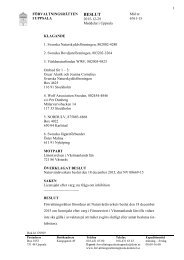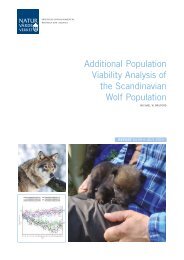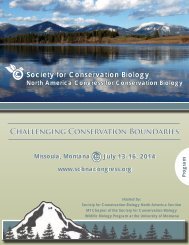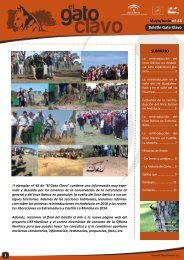1oC3Dbk
1oC3Dbk
1oC3Dbk
You also want an ePaper? Increase the reach of your titles
YUMPU automatically turns print PDFs into web optimized ePapers that Google loves.
Invertebrate Conservation Sub-Committee<br />
(ICSC)<br />
Our aim is to tackle the enormous challenge of how to manage<br />
conservation action for the most species rich taxonomic groups<br />
on Earth. Michael Samways (S. Africa) stepped down as chair of<br />
the group in 2013; Axel Hochkirch (Germany) was appointed as<br />
the new chair in November 2013.<br />
Currently, there are 10 invertebrate Specialist Groups (SG) in<br />
place (Bumblebee SG, Butterfly SG, Cave Invertebrate SG,<br />
Coral SG, Dragonfly SG, Freshwater Crab and Crayfish SG,<br />
Grasshopper SG, Horseshoe Crab SG, Mollusc SG and South<br />
Asian Invertebrate SG). The Terrestrial Invertebrate Red List<br />
Authority (TIRLA) coordinates assessments for all other taxa.<br />
The creation of new SGs will depend on the identification of<br />
potential leadership. A Spider SG is currently being planned.<br />
A total of 2,442 invertebrate species have been assessed in<br />
2013; including 631 mollusc species, 371 sea cucumber<br />
species and 1,440 arthropods. These assessments mainly<br />
reflect the activities of the existing Specialist Groups. We<br />
currently instigate assessments for other taxa (ice crawlers,<br />
abalones) to broaden the scope of The IUCN Red List. Strategic<br />
conservation planning has been started for a crayfish species,<br />
molluscs and a grasshopper species. Three publications were<br />
submitted to scientific journals in 2013. The first one deals with<br />
prioritization of taxa for future Red List assessments and the<br />
second one with the problem of data deficiency for many<br />
invertebrate species (27% of all mollusc species, 36% of all<br />
crustaceans and 30% of all dragonflies have been assessed as<br />
DD). A commentary stating the necessity to conduct<br />
invertebrate species inventories in protected areas has been<br />
published in Science.<br />
We will be attending the World Parks Congress, to foster<br />
invertebrate conservation in protected areas. A new ICSC<br />
strategy will be developed in 2014, and the next meeting of the<br />
ICSC will take place in April 2014. Our website can be accessed<br />
here and you can follow us on Facebook here.<br />
Dr Axel Hochkirch<br />
Chair, Invertebrate Conservation Sub-Committee<br />
Metioche bolivari from Mahé (Seychelles). © Axel Hochkirch<br />
Cycas papuana. © J. Donaldson<br />
Plant Conservation Sub-Committee (PCSC)<br />
Our aim is to mobilize and guide plant assessments and<br />
conservation action within IUCN, and to work with the network<br />
of IUCN SSC Plant Specialist Groups to stem the loss of global<br />
plant diversity. Currently, the PCSC comprises 13 members<br />
made up of ten plant specialist group chairs, and three<br />
representatives of organisations involved in plant conservation<br />
assessments and/or plant conservation. This represents a<br />
subset of the broader plant community within IUCN, where<br />
there are 26 plant specialist groups and three Red List<br />
Authorities.<br />
There is a considerable amount of Red Listing activity within the<br />
plant Specialist Groups. The PCSC does not undertake Red<br />
Listing, but we have been active in trying to smooth the<br />
processes for undertaking and publishing plant assessments,<br />
raising awareness of plant assessment issues with the IUCN<br />
SSC Red List Committee, and prioritizing assessments in order<br />
to understand the global status of plants.<br />
Plants for People is a major new initiative to assess the<br />
conservation status of at least 1,500 priority species from four<br />
plant Specialist Groups (6,000 species in total). Members of the<br />
PCSC have been working with the Global Species Programme<br />
(GSP), the SSC, and the four relevant SSC Specialist Groups<br />
(Crop Wild Relatives, Medicinal Plants, Global Trees and Palms)<br />
to mobilize funding and get the project up and running.<br />
Report of the IUCN SSC Sub-Committees<br />
97






